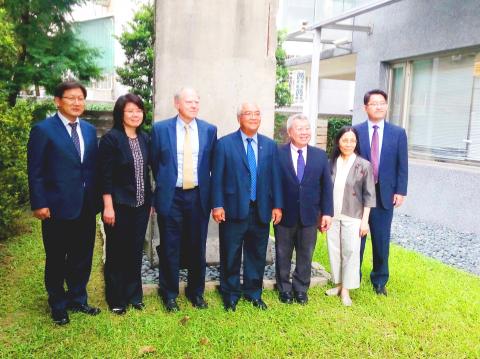The Taipei meeting of the Asian Human Rights Court Simulation (AHRCS) wrapped up over the weekend, with legal experts from Taiwan and abroad presenting workshops and discussions on civil liberties, and holding a trial hearing on the case of Taiwanese death row inmate Chiou Ho-shun (邱和順).
“The convening of the AHRCS served the purpose of acting as a real court, to examine cases in Asia and make decisions based on the precedent of international decisions and treaties pertaining to the protection of human rights,” AHRCS deputy secretary-general Karen Cheng (鄭凱榕) said.
“Details from cases involving the death penalty, torture or corruption were discussed at workshops and presentations given by experts,” Cheng said. “The trial hearing on Chiou’s case was also held. A written judgement on the case will be handed down within three months.”

Photo: Jason Pan, Taipei Times
The idea to create the court simulation was inspired by Taiwan’s experience with establishing a shadow court of the Taiwan Constitutional Court, which addressed issues such as same-sex marriage, the death penalty and transitional justice from 2014 to 2016, she said.
Participating jurists from Southeast Asia included former Malaysian Court of Appeals judge Dato’ Mah Weng-Kwai, National University of Singapore Law School professor Tan Hsien-li and Thai judge Pawat Satayanurug.
Conference participants also discussed setting up an Asian Human Rights Court, a supra-national mechanism composed of judges from participating nations that would try cases.
“It is a path that needs to be taken,” Dato’ Mah said. “The Court could be a standard-setting body for the whole region.”
“Each country has its own political system, but some basic standards on rights are the same,” he said, citing torture as an example.
“Although Malaysia is not a signatory to the UN Convention Against Torture and Other Cruel, Inhuman or Degrading Treatment or Punishment, Malaysian law prohibits torture, in protecting the basic human rights of citizens,” he said.
“In Asia, there are authoritarian regimes where human rights are still abused, but the people there could fight for their rights and strive for democracy through a regional body such as a human rights court. Under such a mechanism, torturing suspects to extract a confession and other forms of cruel and inhumane treatment would be prohibited,” Dato’ Mah said.
Some nations have set up a human rights commission at the national level thanks to years of activism and campaigning by civil groups, he said, adding that the Asian Human Rights Court is the same, as advocates have been pushing for its realization.
Hsu Yu-hsiu (許玉秀), a former Council of Grand Justices member and the main advocate in Taiwan for the plan, said that a regional human rights court would be authorized to deliberate on issues of fact and law, order the release of convicts and fine a government for violating the rights of its citizens.
“The model court could exert real influence on Asian courts, despite lacking the authority to issue legally binding verdicts,” she said.
The AHRCS conference judges presiding over Chiou’s hearing were experts in international human rights law from Taiwan, Malaysia, Singapore, South Korea, Japan, Hong Kong and Bangladesh.

A Ministry of Foreign Affairs official yesterday said that a delegation that visited China for an APEC meeting did not receive any kind of treatment that downgraded Taiwan’s sovereignty. Department of International Organizations Director-General Jonathan Sun (孫儉元) said that he and a group of ministry officials visited Shenzhen, China, to attend the APEC Informal Senior Officials’ Meeting last month. The trip went “smoothly and safely” for all Taiwanese delegates, as the Chinese side arranged the trip in accordance with long-standing practices, Sun said at the ministry’s weekly briefing. The Taiwanese group did not encounter any political suppression, he said. Sun made the remarks when

The Taiwanese passport ranked 33rd in a global listing of passports by convenience this month, rising three places from last month’s ranking, but matching its position in January last year. The Henley Passport Index, an international ranking of passports by the number of designations its holder can travel to without a visa, showed that the Taiwan passport enables holders to travel to 139 countries and territories without a visa. Singapore’s passport was ranked the most powerful with visa-free access to 192 destinations out of 227, according to the index published on Tuesday by UK-based migration investment consultancy firm Henley and Partners. Japan’s and

BROAD AGREEMENT: The two are nearing a trade deal to reduce Taiwan’s tariff to 15% and a commitment for TSMC to build five more fabs, a ‘New York Times’ report said Taiwan and the US have reached a broad consensus on a trade deal, the Executive Yuan’s Office of Trade Negotiations said yesterday, after a report said that Washington is set to reduce Taiwan’s tariff rate to 15 percent. The New York Times on Monday reported that the two nations are nearing a trade deal to reduce Taiwan’s tariff rate to 15 percent and commit Taiwan Semiconductor Manufacturing Co (TSMC, 台積電) to building at least five more facilities in the US. “The agreement, which has been under negotiation for months, is being legally scrubbed and could be announced this month,” the paper said,

MIXED SOURCING: While Taiwan is expanding domestic production, it also sources munitions overseas, as some, like M855 rounds, are cheaper than locally made ones Taiwan and the US plan to jointly produce 155mm artillery shells, as the munition is in high demand due to the Ukraine-Russia war and should be useful in Taiwan’s self-defense, Armaments Bureau Director-General Lieutenant General Lin Wen-hsiang (林文祥) told lawmakers in Taipei yesterday. Lin was responding to questions about Taiwan’s partnership with allies in producing munitions at a meeting of the legislature’s Foreign Affairs and National Defense Committee. Given the intense demand for 155mm artillery shells in Ukraine’s defense against the Russian invasion, and in light of Taiwan’s own defensive needs, Taipei and Washington plan to jointly produce 155mm shells, said Lin,